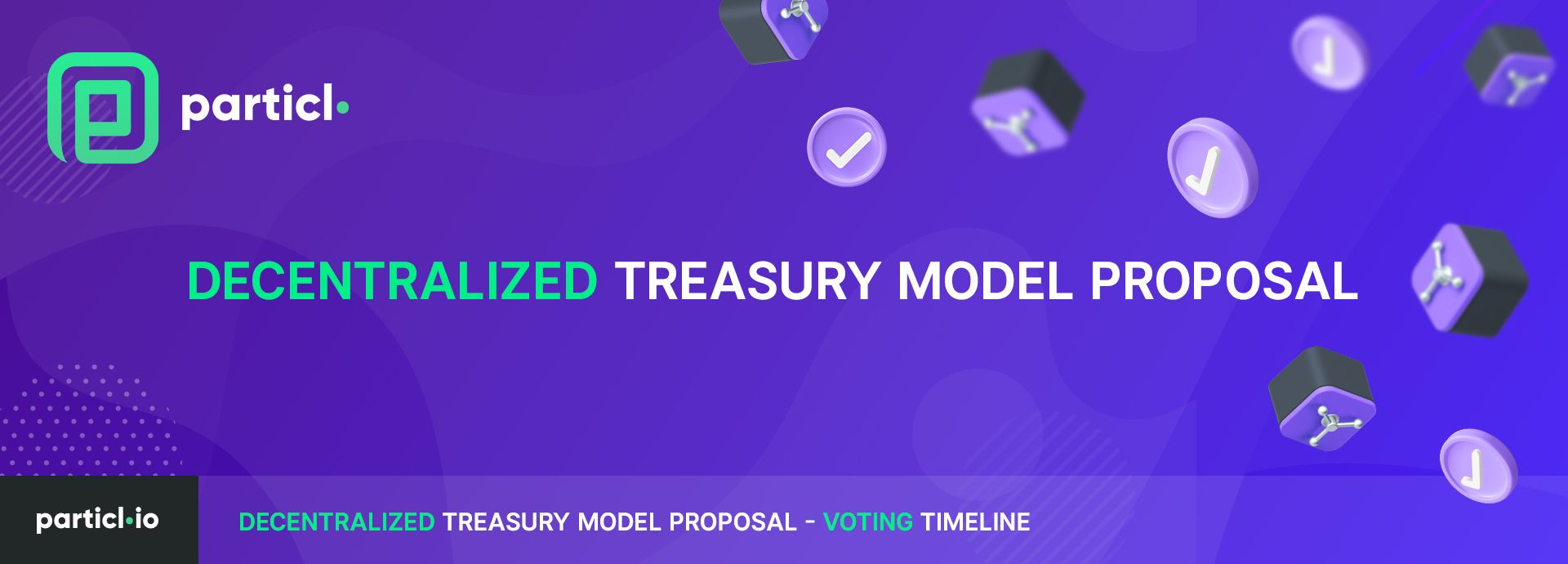
As we mentioned earlier today, we are getting ready to initiate the voting process for the Decentralized Treasury Model proposal. Just like the previous vote on the Output Claim Management proposal, which ended up with a fantastic participation rate, this coming voting period is going to be another first in Particl’s history; the first-ever protocol consensus changing vote.
Let’s see what that means and explore this proposal’s timeline.
The Decentralized Treasury Model Proposal in Short
The Decentralized Treasury Model is a critical proposal that suggests modifying the blockchain parameters to ensure a self-sustainable and steady source of PART income to the ecosystem. If approved, this would lead to creating a Treasury Fund that would collect, at every staked block, a number of PART coins that can then be used by either the Particl team or the community to fund initiatives and projects that benefit the Particl ecosystem.
To learn more about this proposal, you can refer directly to the proposal here or read the related Particl News blog post here.
The First-Ever Protocol Consensus Voting Process
This proposal suggests modifying the PART emission rate and dividing block rewards between stakers and a Treasury Fund. And because the scope of the changes proposed here are quite significant and affect the protocol directly, a “protocol consensus changing vote" is thus required.
A protocol consensus changing vote is not much different than any other type of on-chain voting on Particl. The differences are with the required approval rate, which is 75% instead of 60%, and the duration of the voting process, which is 10,080 blocks (~2 weeks) instead of 5,040 (~1 week).
Aside from these two differences, the process of voting on a protocol consensus changing proposal is exactly the same as voting on a non-protocol consensus proposal.
The Timeline
To give enough time for stakeholders to prepare their nodes for the vote, we want to reveal today the timeline that will lead us to begin this voting process. That’ll allow everyone to prepare accordingly and ensure no block is wasted (i.e., a block that registers no vote).
This Tuesday
This Tuesday (tomorrow), we will close the proposal’s discussion phase and merge it to get it ready for its voting phase. If you still have questions, comments, or general feedback about this proposal, please leave a comment on its Github page before it gets merged.
On the same day, we will communicate the block numbers for when the vote will start and end. Expect a pre-notice of roughly 72 hours (approximation based on average block time) before the vote starts.
Particl’s staking application, Partyman, will also be updated and allow stakeholders to set up their voting preferences in advance so that their node(s) start casting votes as soon as they can.
This Friday
It is estimated that, on this week’s Friday, the voting period will begin. This is only an estimate as the actual time the voting will start is based on a block number, not a specific date or time. As block times can vary (they are on average 2 minutes apart), we can only offer an estimate.
10,080 Blocks Later
10,080 blocks after the voting period begins, or approximately two weeks, the voting period will end and we’ll be able to communicate the official results (they are publicly available on the blockchain).
To ensure the team acts as fast as possible on the outcome of the vote, we will prepare, in advance, builds containing the required modifications for the decentralized treasury model to be implemented.
If the proposal is approved by stakeholders, we will send these builds to exchanges and request their collaboration to roll out the hardfork (exchanges require a pre-notice of several days or weeks). If, at some point, there is a mathematical certainty that the proposal is approved, the team will submit in advance its request to hardfork to exchanges, even if the voting process is not entirely done. That should save the project a few days and allow us to move faster.
If the proposal is rejected, the team will not use the builds it developed in advance and keep, unchanged, the blockchain parameters as they are currently. In that situation, the Particl blockchain will still hardfork, but that’ll only contain changes related to the re-activation of temporarily disabled anon and blind outputs.
Remember, this is a critical proposal for the future of the project and the ecosystem. It has vast implications and may lead to vital changes to the underlying protocol of the blockchain. Regardless of if you want to approve or reject this proposal, it is highly recommended that you cast your vote and let your voice be heard. There has never been a more important time to do so.
As always, we want to thank you for your immense support and hope that you all vote in great numbers on this future-shaping proposal.
Particl is Participation
Get recognized as someone that cares. With your help, we become more noticed out there. It takes seconds, and you are making a statement by giving us a follow and hitting the bell icon.
YouTube Twitter Mastodon Reddit
Join the instant messaging chats. There's no need to be active, but it’s good to be in the loop.
Discord Telegram Element / Matrix
Gain deep knowledge about Particl by reading.
Last but not least, a list that shows an infinite number of links clearly categorized and on one page.